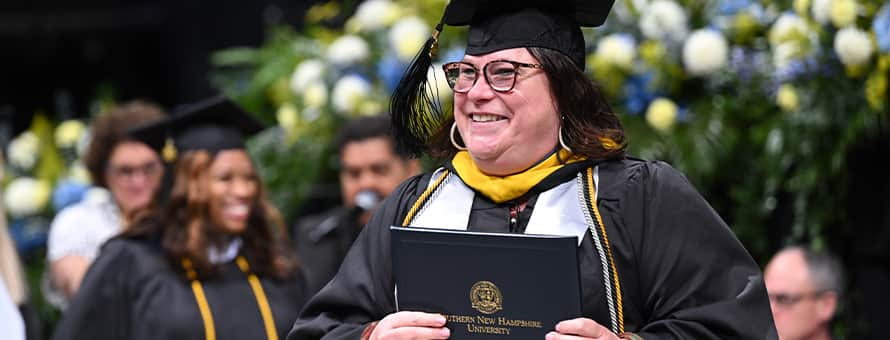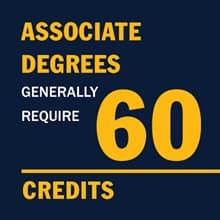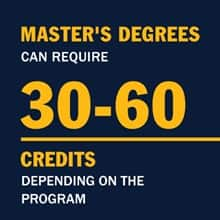How Many Credits Do You Need to Graduate College?

Understanding the numbers
When reviewing job growth and salary information, it’s important to remember that actual numbers can vary due to many different factors—like years of experience in the role, industry of employment, geographic location, worker skill and economic conditions. Cited projections are based on Bureau of Labor Statistics data, not on SNHU graduate outcomes, and do not guarantee actual salary or job growth.
The number of credits needed to graduate from college depends on what degree you want to earn. Each degree has a different credit requirement, takes a different length of time to complete and presents different opportunities for the focus of study and career advancement.
There are a lot of things to consider when earning your college degree. For example:
- Are you concerned about the overall cost?
- Do you have any credits you can transfer?
- Is the time it takes to earn a degree a primary factor?
When deciding on which degree you should earn, having a solid understanding of your options will help you choose what’s best for you.
How Many Credits Do You Need for an Associate Degree?

An associate degree is one of the first levels of higher education you can pursue. Some people will earn the degree to gain access to entry-level professional positions, while others use it as a stepping stone to a bachelor's degree.
Associate degrees are usually 60 credits or around 20 courses. This degree usually takes two years to complete if you're a full-time student. You can also take classes part-time, if your financial aid allows, which will extend the time it takes to graduate.
"Choosing to attend part-time has its benefits for students who need to focus on one course at a time," said Alysia Butler, an academic advisor at Southern New Hampshire University (SNHU). "This could be because of busy family life, long or irregular schedules for work, or a differing learning style."

Butler primarily works with undergraduate liberal arts students. These programs include communications, creative writing, digital photography, English, graphic design, history, and media arts, game art and development, too. She also advises those earning their liberal arts associate degree or their bachelor's in general studies.
If you've attended college in the past or have relevant work or life experience, you may already have a portion of the 60 credits completed that you'll need for an associate degree. A college admission counselor or academic advisor can help you determine if any of your prior experiences can count toward your degree.
Courses in an associate degree program are focused on general education, as well as more specific knowledge if you’re studying to enter a particular field.
For example, an Associate of Arts in Liberal Arts provides a broader academic base than an Associate of Science in Accounting, which will have courses specifically chosen to prepare you for working in a financial department or an accounting position.
What is the Purpose of the General Education Courses in an Associate Degree Program?
Whether general or career-specific, you’ll still need around 60 credits to graduate with an associate degree, and a portion of those credits will relate to general education.
General education courses are important because they can:
- Connect you with people from diverse disciplines
- Help you become well-versed in a variety of disciplines
- Reshape your outlook on learning
- Teach you soft skills desired by employers
The 60 credits you earn from an associate degree program can be transferred to a bachelor's degree, drastically reducing the time it takes to complete a bachelor's program.
How Many Credits Do You Need for a Bachelor's Degree?
What is the Purpose of the General Education Courses in an Associate Degree Program?
Whether general or career-specific, you’ll still need around 60 credits to graduate with an associate degree, and a portion of those credits will relate to general education.
General education courses are important because they can:
- Connect you with people from diverse disciplines
- Help you become well-versed in a variety of disciplines
- Reshape your outlook on learning
- Teach you soft skills desired by employers
The 60 credits you earn from an associate degree program can be transferred to a bachelor's degree, drastically reducing the time it takes to complete a bachelor's program.
How Many Credits Do You Need for a Bachelor's Degree?

A bachelor’s degree may be your education goal from the start or the follow-up to an associate degree you’ve already earned (note: you do not need an associate degree to earn a bachelor's degree). The U.S. Bureau of Labor Statistics (BLS) determined many career fields, especially competitive fields, such as those in the information technology (IT) field, require a bachelor’s degree. Additionally, BLS found 179 occupations that have an entry-level education of a bachelor's degree.
A bachelor’s degree is 120 credits, which is around 40 courses. Typically, earning a bachelor’s degree takes four years, but depending on your previous education and whether you’re a full- or part-time student, it may be a shorter or longer length of time.
How Can I Earn My Bachelor's Degree in 3 Years?
You can potentially get your bachelor's degree faster — in three years or less. Transferring earned credits from courses you've previously completed, such as those in your associate program, can help you reach graduation day sooner. Some colleges also offer college credit for military experience and certifications, and you may be able to test out of classes as well.

Bachelor’s degree programs are designed to prepare you to enter a particular field. Some bachelor’s programs offer you the additional option of studying in a specific concentration. Degree concentrations are specializations within a field of study.
"Concentrations can be vital to a student's career prospects or future plans," Butler said. She noted the graphic design program as an example, and how you could concentrate on user experience design or web design.
"These concentrations have very specific courses that the student takes as they fine tune and advance their skills in these areas," she said.
Similar to a concentration, an academic minor is a way to specialize in an area outside of your major, Butler said, pointing out they're also a great way to explore subject areas that you're interested in.
Adding a minor or concentration to your bachelor’s degree allows you to learn more specifically about the area in which you’re aiming to have a career.
If you've completed your bachelor's degree and are still looking to expand your knowledge, a master's degree could be your next step.
Find Your Program
How Many Credits Do You Need for a Master's Degree?
If you’re looking for upward mobility in your career field, earning a master’s degree can be helpful when it comes time to ask for a raise or promotion. Some employers may offer to help with tuition as an employment benefit in order to retain valuable employees.
Usually, a master's degree, which comes after a bachelor's degree, will take 1-2 years of full-time study to complete. But the time it takes depends on a few factors, including your pacing and field of study.

Most master's degree programs require 30-60 credits. For example, a Master of Science in Psychology at SNHU is 36 credits, while a Master of Fine Arts in Creative Writing is 48 credits.
The difference between master's and bachelor's degrees is that bachelor's degrees often have general education requirements while most master's classes focus primarily on topics within your field of study. There's not really any general education courses. While some of the classes will be predetermined, you might be able to choose from a list of electives. Your curriculum might require you to complete a capstone project or thesis assignment at the end of your program, serving as a culmination of all you've learned.
You can consider taking asynchronous classes online if you want the flexibility to simultaneously advance your career and education. With five term starts per year at SNHU, you might not have to wait as long to get to work on your classes, either. And just because classes are online on your own time doesn't mean there aren't resources such as tutors and a virtual library available around the clock.
Butler said she loves the flexibility of SNHU. "Students can take two courses in one term and then choose to take one course in the next term," she said. This allows you to adjust your course plan so you can finish your degree at your own pace.
If you're not sure you want a master's degree, you can always begin with a graduate certificate. A graduate certificate is beneficial if you want to advance your knowledge in a particular area in a shorter amount of time. While the number of credits you need to complete a college certificate can vary, between 12 and 21 credits is typical.
And, at the end of the program, you may be able to transfer the credits you earned into a master's degree, if you'd like to continue your studies.
Can You Transfer Credits Into a Degree Program?
If you've taken college courses before, you may be able to transfer those earned credits into a new degree program. For example, at SNHU, you can transfer up to 45 credits toward an associate degree, 90 credits toward a bachelor's and 12 credits toward a master's.
How Can You Transfer to SNHU?
Could you have up to 75% of your program done by the time you start at SNHU? Here's how you can find out:
- Complete the free 5-minute online application. There’s no obligation after filling it out.
- Get your transcripts requested — for free. Chat with an admission counselor, and we'll request your transcripts on your behalf.
- Receive your free evaluation. Soon after all your transcripts are in, you'll get your official evaluation. It will show you what was transferred in — and what classes you need to complete.
You could even have credits from certifications or prior experiences that are transferrable into a degree program.
For example:
- Microsoft offers a 365 fundamentals exam, and if you receive a qualifying score, it could count toward your transferrable credits at SNHU
- Advanced Placement (AP) exams and College-Level Examination Program (CLEP) are other common exam-to-college credit opportunities available to move you closer to your degree
- If you're in the military, your education could transfer your military education to college credits
- And if you have any certifications, such as CompTIA or Amazon Web Services (AWS), you may be able to receive credits for them
Bring up any prior experiences with an admission counselor to see if you have credits available to transfer.

Earn Credit Toward a Successful Future
BLS keeps track of weekly earnings and unemployment rates compared to education levels. Year after year, BLS has found higher education attainment has led to higher weekly wages and lower unemployment rates.*
Whether you're just getting started or ready to finish your degree, you can connect with your academic advisor at any time to discuss your course schedule and how you're progressing through your program's required credits.
While education takes commitment, time and money, earning a degree at any level can be advantageous for you and your career.
A degree can change your life. Find the SNHU online degree that can best help you meet your goals.
Ashley Wallis '16 is an Army veteran and writer with a Bachelor of Arts in English Language and Literature from Southern New Hampshire University. She is currently living in the Denver area.
Explore more content like this article

Associate Degree vs. Bachelor's Degree: What's the Difference?

How to Get a Scholarship (And Why It Matters If You Do)

What is Tuition Reimbursement? The Often-Overlooked Employee Benefit
About Southern New Hampshire University

SNHU is a nonprofit, accredited university with a mission to make high-quality education more accessible and affordable for everyone.
Founded in 1932, and online since 1995, we’ve helped countless students reach their goals with flexible, career-focused programs. Our 300-acre campus in Manchester, NH is home to over 3,000 students, and we serve over 135,000 students online. Visit our about SNHU page to learn more about our mission, accreditations, leadership team, national recognitions and awards.


